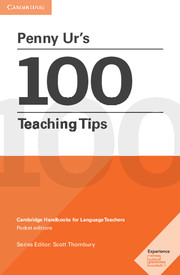Book contents
- Frontmatter
- Contents
- Why I Wrote this Book
- Beginning and Ending the Lesson
- The Coursebook
- Discipline
- Error Correction
- Games
- Grammar
- Group Work
- Heterogeneous (Mixed-Level) Classes
- Homework
- Interest
- Listening
- Pronunciation
- Reading Comprehension
- Speaking Activities
- Teacher Talk
- Testing and Assessment
- Vocabulary Teaching
- Writing
- P.S.
- Index
- Photo Acknowledgements
Games
Published online by Cambridge University Press: 17 November 2023
- Frontmatter
- Contents
- Why I Wrote this Book
- Beginning and Ending the Lesson
- The Coursebook
- Discipline
- Error Correction
- Games
- Grammar
- Group Work
- Heterogeneous (Mixed-Level) Classes
- Homework
- Interest
- Listening
- Pronunciation
- Reading Comprehension
- Speaking Activities
- Teacher Talk
- Testing and Assessment
- Vocabulary Teaching
- Writing
- P.S.
- Index
- Photo Acknowledgements
Summary
Games that involve engaging with the language are useful for raising motivation, especially (though not only) for younger classes. But they need to be carefully selected or designed to make sure they do in fact work: that they are both ‘gamey’ and learning-rich.
21 Make sure games are fun
22 Check games are learning-rich
23 Keep games simple
24 Involve all, or most, students
25 Have more than one winner
21 Make sure games are fun
Check that your game is in fact a game: something which involves some kind of fun challenge.
‘Let's play a game,’ said a teacher I once observed. ‘I’ll say a word, you write it down.’ After a few such ‘games’, the students groaned whenever the teacher said ‘Let's play a game’, and the word lost its meaning.
The point about a game is that it has some kind of challenge that is fun to overcome. Sometimes this is simply competition with an opponent or opposing team; but more often in the classroom it is created by setting a task that is obviously easy, but whose achievement is limited by rules. For example: ‘Find out what I have in my hand, but you can only ask ‘yes/no’ questions,’ (a simple guessing game). Or: ‘I’ll give you all sorts of simple commands (e.g. ‘Stand up!’), but you must only obey the command if I also say ‘Please’,’ (my variation of the game ‘Simon Says’).
The problem with the teacher's so-called game above was that it was no fun. If she had said: ‘I’ll say six words straight off without pausing, see if you can remember and write down at least two of them,’ then there's an element of challenge, and choice, and the activity becomes more game-like.
A lot of routine activities can be made into games by adding this element of challenge.
Let's consider for example the standard activity of practising vocabulary by making up a sentence that contextualizes it. As it stands this is pretty boring, but it gets to be more game-like if you add a condition: ‘Make up a sentence but it must use two of the words on the board’; or ‘… but it must be a true statement about yourself’; or ‘… but it must be obviously untrue’. Or simply add a time limit: ‘You have exactly two minutes: how much of the task can you do in that time?’
- Type
- Chapter
- Information
- Penny Ur's 100 Teaching TipsCambridge Handbooks for Language Teachers, pp. 25 - 30Publisher: Cambridge University PressPrint publication year: 2016



